#Sorites Paradox
Explore tagged Tumblr posts
Text
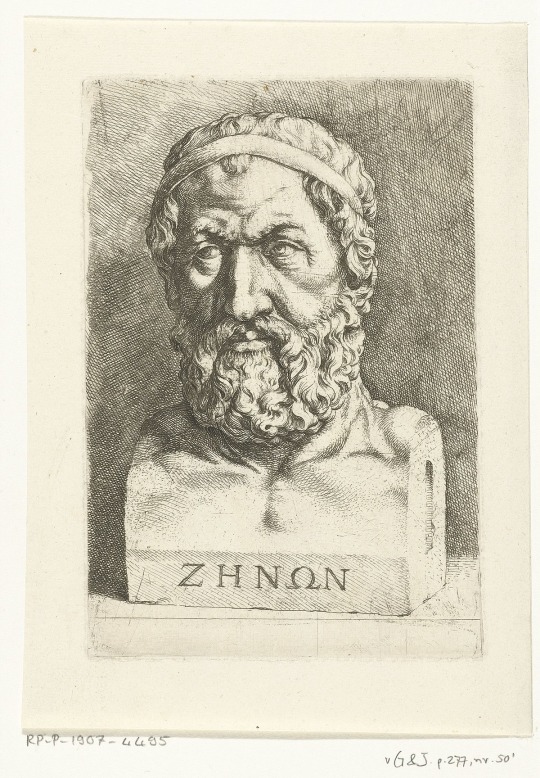
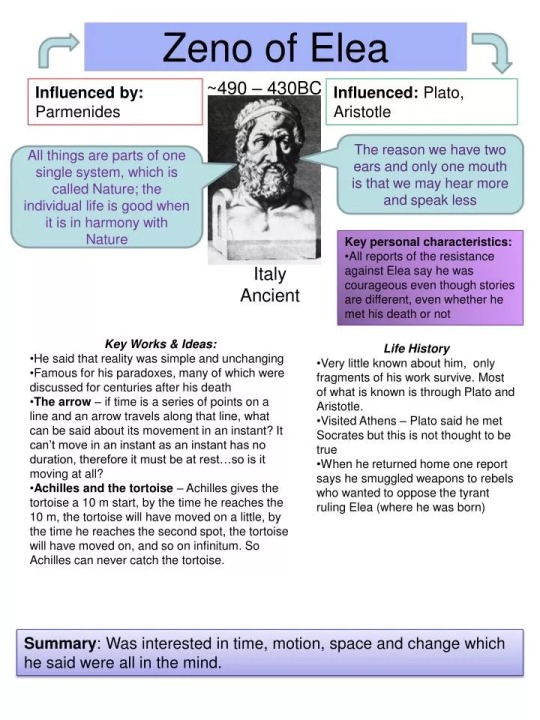
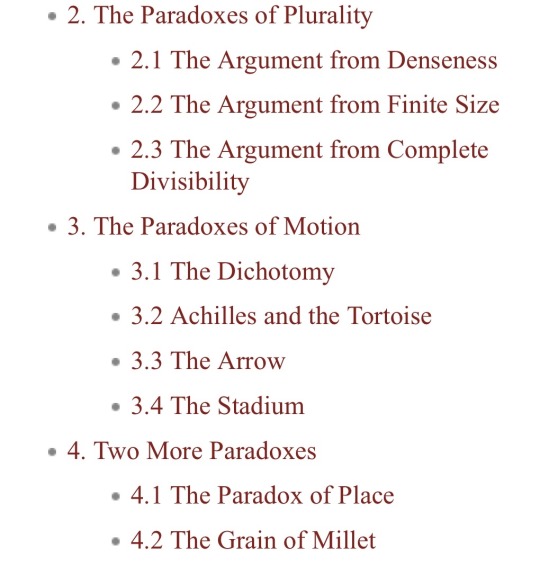

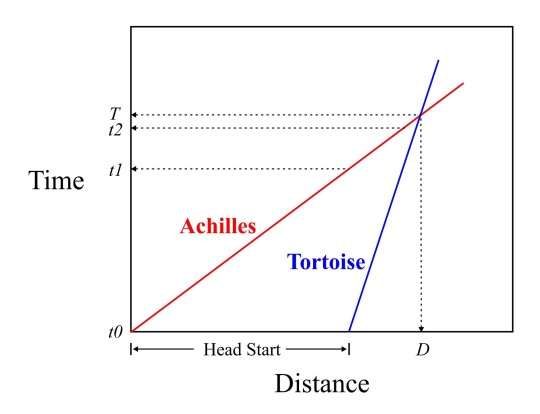
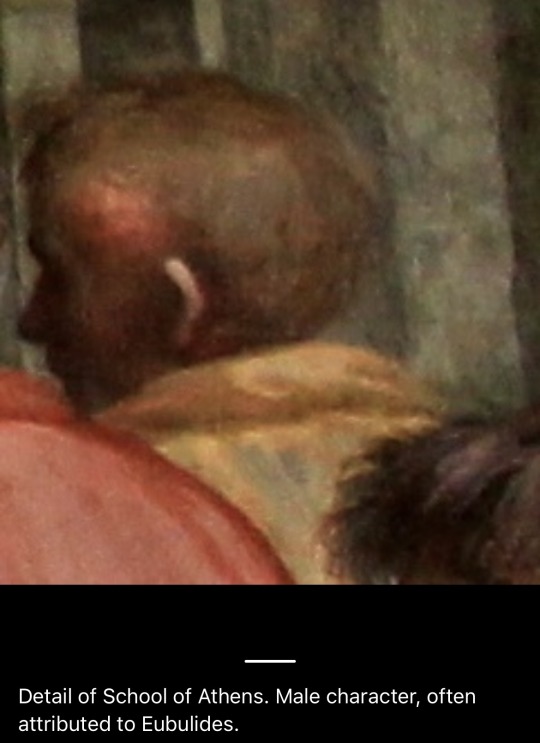
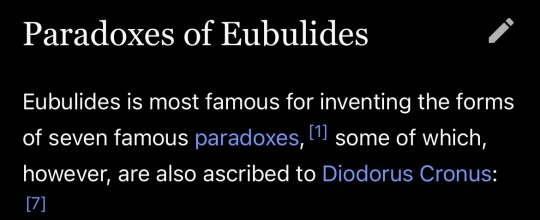

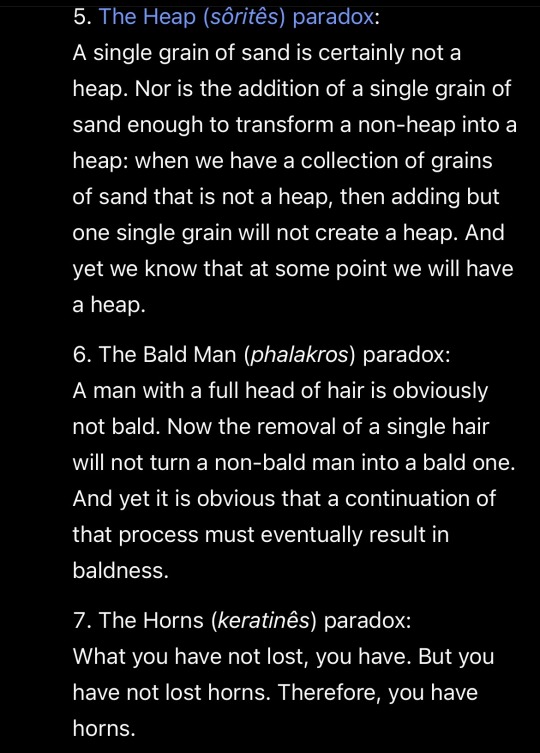

zeno’s paradox - 9 - sorites paradox - eubulides of miletes
🏜️⏳⌛️📚✨🏛️💀☀️🇵🇸🏰🏯🦊⚠️
#zeno’s paradox list#eubulides#sorites paradox#art#poetry#words#dark academia#rhetoric#light academia#web weaving#philosophy tumblr#love#language
8 notes
·
View notes
Text
Conundrums of Consciousness: Navigating the Mind-Bending World of Philosophical Paradoxes
Philosophical paradoxes, challenging perceptions and pushing intellectual boundaries. Explore conundrums such as the Ship of Theseus and Schrödinger's Cat, revealing the complexities of existence and prompting reflection on uncertainty.
Welcome, curious minds and intellectual adventurers, to our exploration of the most intriguing puzzles known to human thought—philosophical paradoxes. These are not just your average brain teasers; they are the mental gymnastics that philosophers, scholars, and the perpetually puzzled have wrestled with for centuries. Imagine trying to solve a Rubik’s Cube in pitch darkness, where each twist…
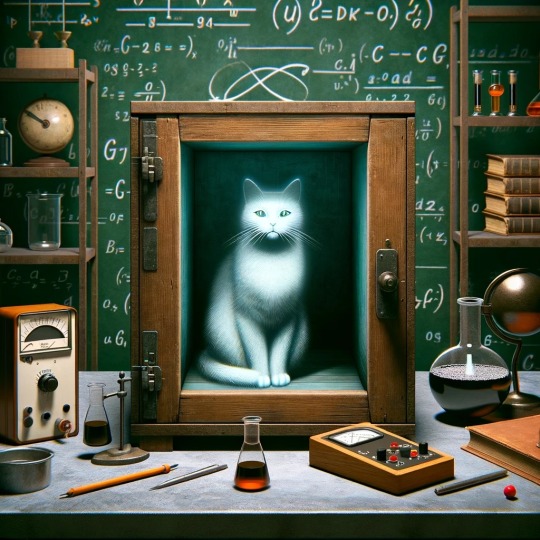
View On WordPress
#Achilles and the Tortoise#Adventures#Barber Paradox#Conundrum#Court#Curious#Dead or Alive#Determinism#Free Will#Heap Paradox#Liar#Mortality#Omnipotence#Paradox#Paradox of Choice#Prisoner#Probability#Raven#Schrodinger&039;s Cat#Ship of Theseus#Sorites Paradox#Stranger than Fiction#Thrift#Time Travel#Tolerance#Trolley Problem#Twin Paradox#Unexpected Hanging#Value
2 notes
·
View notes
Text
at first you think studying logic will be logical.
then you find yourself crying over grains of sand and wondering at which point they can be classified as a heap of sand.
#logical fallacies#logic#sorites paradox#paradox#where do we draw the line#at what point are two opposing things distinguished from one another
7 notes
·
View notes
Text

Had to draw jayvik in their shiny lil outfits from StarSparrow84/ @jawsdrawsstuff’s fic because it’s given me brainworms in the best way.
HIGHLY recommend checking it out if you haven’t!
#you don’t understand it’s so good#the CHARACTERIZATION#the DESCRIPTIONS#the PERFECT BLEND OF SASS AND ANXIETY FROM VIKTOR#absolutely scrumptious#my art#arcane#arcane fanart#jayvik#jayvik fanart#jayce talis#viktor#viktor arcane#jayce x viktor#dressing up characters like barbie dolls
114 notes
·
View notes
Text
Jayce and Viktor go to a fancy party and it almost kills them
#arcane#arcane fanfic#jayvik#jayvik fanfic#jayce talis#viktor arcane#viktor#caitlyn kiramman#mel medarda#caitlyn & jayce
22 notes
·
View notes
Text
why do so many captchas feel like they go "please click the first image that depicts a heap" and then they show u a sorites sequence
or more like, "click all squares containing [type of object whose boundaries are inherently vague]"
is this like the thing where if u tell a robot a "paradox" (usually meaning: the Liar), theyre supposed to explode? thats what im choosing to believe now. and they say philosophy has no practical applications!
38 notes
·
View notes
Text
The “villainy is a choice drugs are good” speech was actually only the second-worse PR disaster Taylor had with kids. The worst one was when she tried to use her swarm to teach them the Sorites paradox.
118 notes
·
View notes
Text
For added context,
The Raven Paradox is the paradox that observing a non-black non-raven should increase your credence in the belief that all ravens are black. I.e. a green apple confirms all ravens are black.
The Sorites Paradox is the paradox that removing a single grain of sand from a heap of sand doesn’t make the heap of sand any less of a heap. Continue the process of removing single grains however many times you like, and eventually the heap will be gone. But no individual grain of sand could be the difference between the pile being a heap or not, though a collection of individual grains is all the heap ever was.
12 notes
·
View notes
Text
"Amidst Stars Spread Out Immeasurably Like Sand, There is One Star Shining Towards me"

The Case Files of Jeweler Richard Side Story: Masago Nasu 真砂なす(Like Sand)
Finally, finished reading that side story. It took it to the last split part to actually get to the title's meaning that had been in a riddle to me for all this time. As it turns out, it's a from a song/haiku from poet Masaoka Shiki (1867–1902) from the Edo period in old Japanese and the nasu would be something like のうような or と同じくらい or 形づくる, basically a fancy way of saying 'like'.
『真砂なす数なき星の其その中なかに吾われに向かひて光る星あり』
Amidst stars spread out immeasurably like Sand, there is one star shining towards me
Which is to say, this is the origin story of Seigi's shift to calling Richard his 'shining star" in volume 12. It was just a little detail dropped in a conversation with Minoru, not explained, but probably noticeable to any observant reader as it has nothing to do with gemstones or natural phenomenon or anything he used previously.
Also.
Every time he calls him that, it's literally actually a confession basically???
I mean, that's pretty much the same thing they already did in Moonstone?? Just using a piece of more obscure classic literature that isn't so overused, like Souseki's The Moon is Beautiful. And with none of that teasing playfulness.
I still think Claire the Lune has to be right after the bulk part Masago Nasu, before its epilogue. It didn't get so much of a confirmation rather than another reference (Seigi having to realize, he's not the youngest any more, when he overeats.) And with that it's a whole string connecting it all together. But in any case, this is a direct prequel to the Overture side story. Which again is a direct prequel to volume 12. Both of them along of with v12 exorbitantly make me think of....
Series convergences (that maths thing) or the Sorites Paradox.
As in: How close do you have to get, how many grains do you have to pile up until it is basically as good or actually that same thing?
Seigi keeps insisting he's Richard's "Private Secretary". And it's his way of differentiating it from that usual stuff, to which he has clearly distanced himself more than one time. That's not the nature of their relationship, despite anyone outside thinking it could only be that. I still remember how I felt like screaming to the void when he declares as much to Jeffrey in the Otsukareta Hanashi short story (from Tsujimura-sensei's blog) that is set right after the epilogue of volume 10. (I mean, how often do you get something served that screams queerplatonic and then basically confirms it even if it doesn't use the word?)
But is it that still? (Was it that to begin with??) Does that differentiation even matter at this point? Couldn't they just go with that usual way?
In Ouverture the topic of marriage gets brought up by a Sri Lankan woman, Seigi dodges it, but there is no way he hasn't considered it. It's cut short by an interference by Richard. Seigi and Shimomura have a phone conversation and Shimomura treats his work as the same as a Jeweler, Seigi corrects him, his job title is 'private secretary' and he's stubborn about that, but also by this point, as Shimomura points out, he's doing effectively that very same work. Saul makes sarcastic implications about that job title in Masago Nasu, only for Richard to cut him short and basically muzzle him. But Seigi even has to and does agree. He even reiterates that fact in v12 by his own accord, his work is now essentially the same as Richard's as a jeweler (though he says he's still a sort of lesser Richard.) And 'private secretary' which really is his very Seigi-roundabout way of naming their nature of relationship that also just makes sense only to them. And the analogy to their relationship is palpable. It's been a running trope since at least Diamond that they look like a couple, but they have piled up a lot more of things that make it look just like that. And short stories like the Itsuka Operaza de actually depict the details from an outsider's eyes with more details, which almost feels like the narrative is trying to make a persuasive case.
And then there's Masago Nasu's main point. Saul telling them the story of his and his wife Masago, over whom he sing-sangs another ancient love poem, including a word that means sand and is her name. And he warns them, they are so similar, their headspaces are similar, it's like their souls are twins, so they are prone to not talk about some things, because they simply already know. But if tragedy strikes (Masago dies by the machineries of Truck-kun), you may be left with the regret of not having said enough that you loved them, when you had the chance. And there's the whole chess play, with Richard first being in a clear lead, but then bang, Saul drove him into checkmate, things aren't always going the way you think they will.
And Seigi has bullocks of things to say, but doesn't manage while it's probably super simple actually (he even basically concludes this in Clair de Lune!) while also not, but also he probably wouldn't ever use it that way, because as he already says in Sardonyx it feels like it would become trite to say it like that. Also, he's probably scared in a few ways about that on top of it. Not being able to say anything is 'salvation' to him. But also, Richard's waiting for that. Although clearly he very much knows already what it would be, because in all the numerous roundabout ways Seigi has long since said it, more than just a trillion times, but still apparently thinks he hasn't, but kind of also, he knows Richard knows (because he kinda always knows what he wants to say). But despite that, Richard looks very much like he wants to hear that. (At least that interlude in v12 and many other spots has him always look like internally sighing.) So he waits for Seigi to get there. (And even keeps any external interference away for him at that.) But what's worse, Seigi knows that. But still fails to, at this point, mostly because he keeps dodging the easy ways that are.
Couldn't they just settle for that usual thing? It really does undeniably look very similar. It would be simpler.
But where's the beauty in that trite simplicity? Why round up the convergence value, if you can have a beautiful endless irrational number?
(And there is still undeniably something still different. Or why make the point that they are sleeping in different hotel rooms or still have their own floors in the Sri Lankan house so clearly?)
It's a convoluted something, but unlike any other case of can't they just open their mouths and talk turkey?? It doesn't feel like there will be any miscommunication drama to be had here whatsoever.
Oh, I dig this dodgy roundabout way of all sorts of coded analogies, context-sensitive, but to outsiders entirely incomprehensible metaphors and talking around the bush while also having zero of the bad consequences not talking straight typically has in that old trodden infuriatingly stupid trope. I so dig it.
.... But I still also want to shake Seigi a few times though. Just because he says he'd wait a hundred years until you are both just bones in your graves; don't have this way too patient poor tsundere wait so long for it. Get it over or just settle on that there is no need to do this talking between you and don't tease the poor fellow so much. :<
In any case, quite curious where this is going to go towards in the next volumes. There seems to be little plausibility that this doesn't get picked up as a theme one way or another, me thinks.
Less than a week left until v13~
#ramblings#translation#english translation#light novel#the case files of jeweler richard#housekishou richard shi no nazo kantei
51 notes
·
View notes
Text
ok im gonna eat popcorn watch criminal minds (im doing a character study it’s for my fic shut up…. it’s productive….. seriously STOPPP guys stop😭🛑!!!) and THEN im gonna study for my philosophy exam!! sorites paradox i am COMING for you😍😍 gna figure out wtf a penumbra is once and for all!!
11 notes
·
View notes
Text
OG! Penelope Eckhart Headcanons: The Soul
Part 4!
——SPOILERS AHEAD FOR NOVEL——
This is also an extension of Part 3's Abilities and also Part 1's Appearance, just compiled here because it deals with her soul more.
I've had to split this post in two, it's TOO LONG.
Catalysts & Fictional/Modal Realism
First off, I think Penelope to be the "Catalyst" of the world.
What is a Catalyst? For example, when you start writing a story, you usually have a basic premise, and you start on the main character first, right? They get fleshed out first, and the complexity of the world and characters(aka the setting and cast) are determined by their importance to the story, and by extension, the protagonist. Everything connects back to the MC.
A world is kept alive by its Catalyst, but that isn't necessarily true in reverse. A Catalyst is strong enough to sustain itself.
A CATALYST DOES NOT HAVE TO BE A CHARACTER. IT COULD BE A CONCEPT. AN OVERARCHING TROPE. THE NARRATIVE ITSELF. IT COULD BE MULTIPLE CHARACTERS SHARING THE ROLE OF ONE CATALYST.
Now, that means the main character is usually the Catalyst. Of course, you could have a world with multiple Catalysts, unconnected or connected. Or you could have a world with no Catalysts, like how I hc our world to be. Worlds/tropes or AUs that are common enough(such as Harry Potter AUs) either don't have Catalysts in the first place, or the power of a Catalyst has disseminated sufficiently for there to not need one in the first place.
Sometimes, a world will have One Catalyst and ONE ONLY. It can only be supported by that Catalyst, and otherwise would be "lost" and basically freeze in the same manner.
Penelope's soul was explicitly mentioned to affect the world. Ergo, Catalyst. Permanent Catalyst, even.
Catalysts, compared to other characters, are MUCH MORE connected to the narrative of their story(getting very meta here) than other characters will be.
So. Penelope, being a Permanent Catalyst and also from discerning the clues given by her ancestors' spirits/the System, is self-aware that her world, her life is a story in another world.
This is somewhat along the lines of Fictional Realism, also known as Modal Realism proposed by philosopher David Lewis. Essentially, it proposes that all fictional/possible worlds are real in the same way our world is.
TLDR: the stories of other people in our world or others appear to writers' consciousnesses to be told as fiction, across different worlds. Our lives could be speculative, slice-of-life futuristic fiction for a medieval society for all we know.
We're not even DONE with Penelope's soul, oh no.
Warped Souls & The Sorites Paradox
As we know already, Penelope's soul in canon was said to be shattered under the strain of so many lifetimes, spreading across many other worlds. My headcanon is a bit different.
I think her soul tore off piece by piece until it was so fragile that it ripped itself apart. Keep in mind the word "tore" and "ripped".
The soul, in my headcanons, is an inflexible thing. But Penelope's soul, which was strong enough to completely stop the passage of time of an ENTIRE UNIVERSE(keep in mind that weather phenomena, the time of day, etc. also paused given that there were no incongruities), is flexible.
Now, a shattered soul can usually be put back together, unless in extenuating circumstances. Even then, there is still a chance of reincarnation, and being made whole while waiting for reincarnation.
HOWEVER. Penelope's is different. Hers is like fabric(ha, insert namesake joke again). Now, think of something delicate or loosely-woven, like silk or gauze. If you keep tugging on it, not so hard to rip it into pieces, it begins to warp and distort. That's basically what's happening to Penelope's soul.
It gets warped out of shape, ripped up, and those pieces get distorted again. Eventually, the more you pull, the more the pieces become threads.
Think of that as the effect of continuous regressions, for literal MILLIONS— NO, A LITERAL BILLION YEARS— on the soul. Yeah, Penelope's really fucked up.
A warped soul is extremely hard to put together when you have frayed edges, loose threads, and nothing lays flat anymore. Nothing fits together anymore.
So. Soul is unfixable. Oh no.
I think Siyeon was able to have a functioning soul because of the same principle— she was such a warped piece of Penelope's soul that she was literally stretched out enough to fit the general size of a soul to have a semblance of a normal existence. Of course, there are gaping holes, but the size is approximate enough.
ANYWAYS. Penelope works this out thanks to the System(elaborated later on in this post) and has a massive OH NO.
Touching back on the "Perfect Memory" in Part 3, it was a side effect of a magic ritual she had partially created. It was a method to keep her soul somewhat together as a temporary solution.
In addition, it was to prevent the erosion of Penelope's memory, so that she could continue to live without committing the mistakes of before.
It basically works like a permanent basting stitch, commonly used to hold different layers of fabrics together. It prevents Penelope's soul pieces from drifting off on their own.
The pieces are tiny, and theoretically are extensions of Penelope's physical body as well(for example, manifesting butterflies, who are symbols of the soul, to act as tiny spies that only she can see. Like the spirits mentioned in Part 3, they can also become visible to others).
This ritual was really only a small bandaid over a gaping wound.
We move to the next theory/thought experiment. The Sorites Paradox questions the boundaries of categories by asking when a heap of sand stops being a heap as individual grains are removed, highlighting the challenges of defining precise transitions and the inherent vagueness in our concepts.
Penelope's soul, as mentioned, is both distorted and ripped apart. In addition, her soul record(aka her lifetime as Penelope Eckhart) is perhaps the longest, and near incomprehensible that any Underworld Judge or God will ever read.
At some point, how much distortion and abuse can the very essence of a soul take until it has lost the identity of "human"?
We can say she is more of a vengeful ghost than a human, but still retaining vestiges of humanity.
In combination with the fact that she's the Catalyst... perhaps a better term would be "Divinity" in some cases?
Her domain is literally the millions of iterations of her own world, supported by her own power.
She slowly siphons her power back by destroying the worlds wrecked by Laila's takeover. Penelope allows the worlds where she died early to continue since the negative energy brought upon by Laila's victory would nourish her more.
I haven't read Heaven's Official Blessing/TGCF, but I guess she's probably akin to a high-level ghost...? An extremely high-level Supreme? An in-between with a living body.
Speaking of body, her physical body actually has signs that reflect the state of her soul. They manifest as either wounds or tattoo-like markings.
Soul Precognition and Transformation
Souls, I believe, are not chained to time like the living; they can technically exist in different time periods without knowing, but if they anchor themselves to a living being, then they lose that ability temporarily.
Penelope's soul, being so fragmented and warped, as well as being a Catalyst, can have some(?) foresight? It's usually just a really good gut feeling, but she can peer into the "narrative" of a small subset of people. The criteria are unclear, but she's able to see enough or gain impressions of a future that help her form perceptions of that person.
She can peer into the past time loops and even visit them: they're like tiny little rivulets branching out from a raging river to her.
Incidentally, when tracking down her soul pieces, Penelope found Siyeon.
She watched, in terrible, bitter jealousy, as Siyeon easily won the love she herself had wished for. And how Siyeon easily forgave the others(such as continually interacting with them), and even had a daughter that Callisto, the man who let her die in childbirth so many times, doted on.
Uh... safe to say, Penelope was furious and ripped Siyeon's soul back into the proper place in Penelope's collection of soul pieces. She also wiped Siyeon's memory and Siyeon's timeline.
However, it convinced Penelope that unless she actively worked to keep her soul together, then another Siyeon would happen.
Until today, it's not clear if Siyeon truly did happen, or if it was the future of that soul shard that Penelope only saw. But she actively works to prevent the existence of Siyeon, permanently suppressing that shard and focusing her efforts on reweaving it back to a semblance of normalcy.
#lysia's posts#lysia's narratives#villains are destined to die#vadd#death is the only ending for a villainess#death is the only ending for the villainess#ditoeftv#penelope eckhart#original penelope eckhart#og penelope eckhart#og! penelope eckhart#og penelope#og!penelope hcs
30 notes
·
View notes
Text
The word Trance implies a passing beyond, scil. [lat: or], the conditions that oppress. The one and only objective of all training, both Magical and Mystical, is to become free from any kind of limitation. Therefore the body and mind, in the broadest sense, are obstacles on the Path of the Sage: the paradox, rather tragic as it appears, is that they are also the means of progress. The problem lies in how to get rid of them, go beyond them or transcend them, and this is as strictly practical and scientific as that of eliminating impurities from a gas, or of the skilful use of mechanical laws. Here lies the inevitable and logical flaw in the Adept's sorites, for he is bound by the principles which are the object to be overcome: and upon him who seeks to arbitrarily discard them they hasten to take a terrible revenge! It is in practice, and not in theory, that this difficulty suddenly disappears. For when we take rational steps to suspend the activity of the rational mind, inhibition does not result in chaos, but in the understanding of the Universe through the means of a faculty to which the laws of Reason are not applicable; and when, having returned to the normal state, we try to analyze our experience, we find that the description abounds in rational absurdities." “... any Magical Operation is complete only when it is characterized (in one sense or another) by the intervention of a Trance”. Taken from: "Small Treatises towards the Truth", by Aleister Crowley, Edizioni Centro Studi e Ricerche C.T.A. 102, S.O.T.V.L. series - Initiatory Traditions - translated and edited by Marzio Forgione. For info and purchases write to: [email protected]

2 notes
·
View notes
Text
like most of the work in an induction proof is showing that if predicate P holds for every natural number between 1 and n, then it is also true for n+1. the sorites paradox breaks because P in this case is ill-defined, and thus that cannot be proved.
2 notes
·
View notes
Text
My Collection of Paradoxes
One of the Greatest Paradoxes: of your physical senses is that your eyes actually show you what you believe, not what you see.
Paradox can be useful tools for exploring the limits of our understanding and for challenging our assumptions and beliefs.
Here is a list of some well-known paradoxes:
1. The liar paradox: "This sentence is false."
2. The sorites paradox: How many grains of sand make a heap?
3. The Barber paradox: A barber shaves all men who do not shave themselves. Who shaves the barber?
4. The paradox of the ship of Theseus: If all the parts of a ship are replaced, is it still the same ship?
5. The paradox of the heap: If you remove one grain of sand at a time from a heap, when does it cease to be a heap?
6. The omnipotence paradox: If God is all-powerful, can God create a stone that is too heavy for God to lift?
7. The Achilles and the tortoise paradox: In a footrace between Achilles and a tortoise, if the tortoise starts ahead, can Achilles ever catch up?
8. The unexpected hanging paradox: A prisoner is told he will be executed on one of the next seven days, but will not know which day until the executioner arrives. The prisoner reasons he cannot be executed on the seventh day because that would not make it unexpected. But then he reasons that he cannot be executed on the sixth day for the same reason. This continues until he concludes he cannot be executed on any day, and is surprised when he is executed on the seventh day.
9. The grandfather paradox: If you traveled back in time and killed your own grandfather before he had children, how could you exist to travel back in time in the first place?
10. The Fermi paradox: Given the size and age of the universe, why have we not yet encountered any extraterrestrial civilizations?
11. The Paradox of Certainty: The more certain you are about something, the more likely it is that you are wrong.
12. The Paradox of the Present: The present moment is always changing, so it is never truly present.
13. The Paradox of Choice: Having too many choices can make it harder to make a decision, but having too few choices can make you feel trapped.
14. The Paradox of Perception: Our perceptions shape our reality, but our reality also shapes our perceptions.
15. The Paradox of Success: The more successful you become, the more expectations others have of you, which can lead to greater pressure and stress.
16. The Paradox of Control: The more you try to control something, the less control you actually have.
17. The Paradox of Time: Time moves slowly when we want it to go quickly, and quickly when we want it to go slowly.
18. The Paradox of Knowledge: The more we know, the more we realize how much we don't know.
—
The Paradox of Self-Improvement: If you are constantly striving to improve yourself, you are implicitly acknowledging that you are not good enough as you are. But if you accept yourself as you are, you may lose the motivation to improve.
This paradox highlights the tension between self-acceptance and self-improvement. On the one hand, it is important to accept and appreciate oneself for who they are, flaws and all. On the other hand, it is also important to strive for self-improvement and personal growth. The paradox arises when one tries to balance these two seemingly opposing values, as the pursuit of self-improvement can sometimes contradict the goal of self-acceptance.
—
The Paradox of the Final Destination: Imagine you are traveling to a destination that you know is your final destination, and you must reach it in order to fulfill your ultimate purpose in life. However, the closer you get to the destination, the further away it seems to be. No matter how much progress you make, the destination always appears to be just out of reach, as if it is constantly moving away from you. So, you must continue to pursue it, but the pursuit seems endless and futile.
This paradox challenges the notion of having a fixed and predetermined purpose in life, and suggests that the pursuit of that purpose may be never-ending and ultimately unattainable. It also raises questions about the nature of progress and achievement, and whether they are truly meaningful if the ultimate goal remains forever out of reach.
—
Here is a list of new paradoxes:
1. The Paradox of Generosity: The more you give, the more you receive, but the more you receive, the less you feel inclined to give.
2. The Paradox of Honesty: Being completely honest can sometimes lead to negative consequences, but lying can also lead to negative consequences.
3. The Paradox of Freedom: The more freedom you have, the more responsibility you have, but the more responsibility you have, the less free you may feel.
4. The Paradox of Perception: Our perception of reality is based on our limited perspective, but our limited perspective is also what makes reality meaningful to us.
5. The Paradox of Creativity: The more creative you are, the more original your ideas are, but the more original your ideas are, the more likely they are to be rejected or misunderstood.
6. The Paradox of Progress: The more progress we make, the more problems we encounter, but the more problems we encounter, the more opportunities we have to innovate and grow.
7. The Paradox of Communication: The more we try to communicate clearly, the more likely we are to be misunderstood, but the less we communicate, the less likely we are to be understood at all.
8. The Paradox of Individualism: The more we assert our individuality, the more we risk losing our sense of community and belonging, but the more we conform, the less authentic and fulfilled we may feel.
These paradoxes may seem contradictory or paradoxical, but they can also offer insight into the complexities of life and challenge us to think more deeply about our assumptions and values.
2 notes
·
View notes
Text
My sister insists the answer to Sorite's Paradox is 3. Three and above is a pile, two and below is not a pile. It's as simple as that.
solved the paradox of the ship of Theseus btw!! turns out the answer was “it depends”. hope that helps, have a good weekend everybody!
43K notes
·
View notes
Text
Sorites paradox? More like Soriteez nuts (I get awarded extra points because it sounds like “so ride these nuts”)
0 notes